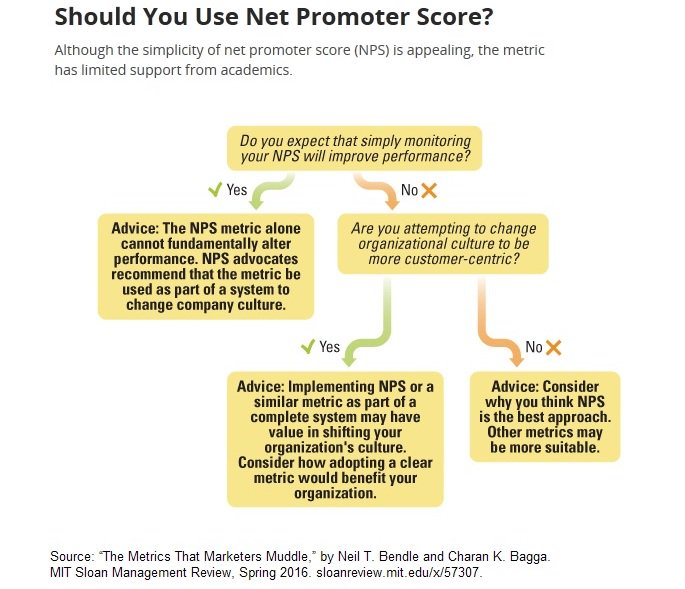One of the most interesting discussions about marketing metrics in recent years concerns the Net Promoter System/Score, (NPS).
Net Promoter
Net Promoter is very simple. It compares % of customers who give high scores on “would you recommend to a friend?” with % of customers who give low scores. The Net Promoter is just the high score % minus the low score %. Any positive numbers show you have more recommenders than detractors. It is pretty intuitive that firms whose customers are happy to recommend are, all else equal, probably more successful than firms whose customers aren’t.
There are however caveats. You can’t compare across industries as some firms might make products that people are happier to recommend. As such, there isn’t a magic number that represents success. (Of course, similar things can be said about most metrics). Some managers just look at changes which makes sense; is your number getting better or worse?
Selling NPS
Where it got interesting was how it was sold. Frederick Reichheld, used his Bain consulting skills and sold NPS brilliantly, getting people like Jeff Immelt of GE to endorse it. Not afraid to over-claim Reichheld said that NPS answers the “ultimate question”. That this is the only metric you need to know is way too strong of a claim. NPS may rise as companies cut prices but this doesn’t guarantee success. Marketing is about satisfying customers while achieving your objectives, e.g., profits. Any fool can please customers when giving away free stuff. There are other metrics, e.g., margin, you should know.
Allergic to consultant hyperbole academics showed that NPS isn’t even anything special compared to other “satisfaction” metrics. Customer satisfaction is a great thing but there is no magic to NPS. As Keiningham, Cooil, Andreassen, & Aksoy (2007) say:
“Using industries Reichheld cites as exemplars of Net Promoter, the research fails to replicate his assertions regarding the “clear superiority” of Net Promoter compared with other measures in those industries.”
Keiningham, Cooil, Andreassen, & Aksoy (2007)
For those who don’t speak academic, this translates as: “Reichheld is full of it”.
The Use Of NPS
That said, I saw a speaker from a large company with a reputation for poor customer service. The company implemented NPS and now, apparently, pays greater attention to customer satisfaction. I became a little less cynical. One benefit Reichheld claims is simplicity. To be fair, simplicity is a major virtue for metrics. Reichheld claims implementing NPS brings organizational focus onto satisfying customers. The benefit, therefore, goes beyond the raw metric, and he probably has a point.

Despite their widely acknowledged importance, some popular marketing metrics are regularly misunderstood and misused. Here’s how to clear up the confusion that surrounds five common marketing metrics. Neil T. Bendle and Charan K. Bagga March 15, 2016, https://sloanreview.mit.edu/article/the-metrics-that-marketers-muddle/
NPS is likely much better than nothing. Net Promoter isn’t the only metric you need to know but I guess it is fine to start there if the only alternative is knowing nothing.
For more on Net Promoter see here.
Read: Timothy L. Keiningham, Bruce Cooil, Tor Wallin Andreassen, & Lerzan Aksoy (2007) A Longitudinal Examination of Net Promoter and Firm Revenue Growth, Journal of Marketing, Vol. 71 (July), 39–51
